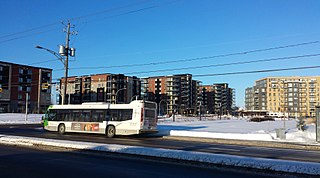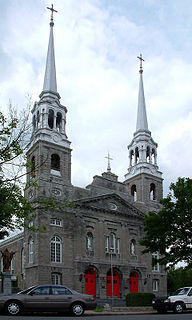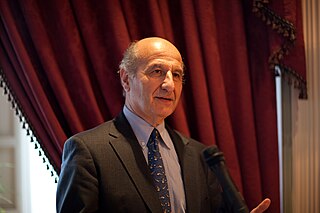
Blainville is an off-island suburb of Montreal located in southwestern Quebec, Canada. Blainville forms part of the Thérèse-De Blainville Regional County Municipality within the Laurentides region of Quebec. The town sits at the foot of the Laurentian Mountains and is located 35 kilometres (22 mi) northwest of downtown Montreal.

Mirabel is an off-island suburb of Montreal, located in southern Quebec.
The French term l'État québécois, literally translated, is "the Quebec State". "State" can refers to public authority, or a state apparatus, )as in société d'État "a state-owned enterprise, federal crown corporations "). It may be used to contrast the provincial government of Quebec with the private sector, or the federal government, known as l'État fédéral or l'État canadien.
The 2000–2006 municipal reorganization in Quebec resulted in large-scale amalgamation (merging) of smaller municipalities in Quebec into larger cities. It was undertaken by one administration, and modified and partially undone by its successor.

Le Sud-Ouest is a borough (arrondissement) of the city of Montreal, Quebec, Canada.
Montreal was one of the cities in Quebec affected by the 2000–2006 municipal reorganization in Quebec. On January 1, 2002, all the municipalities on the island of Montreal were merged into the city of Montreal.

Sainte-Geneviève was a municipality located on the Island of Montreal in southwestern Quebec, Canada. It is now part of the Borough of L'Île-Bizard–Sainte-Geneviève in the City of Montreal, created on January 1, 2002.
The province of Quebec is divided into units at the regional, supralocal and local levels. The primary types of subdivision are administrative regions, regional county municipalities (RCMs), metropolitan communities (CMs), the Kativik Regional Government (KRG), unorganized territories (TNOs), agglomerations, northern villages, Cree villages, Naskapi villages, and a variety of local units which may collectively be referred to as local municipalities and boroughs.
An agglomeration, or urban agglomeration, is an administrative subdivision of Quebec at the local level that may group together a number of municipalities which were abolished as independent entities on 1 January 2002 but reconstituted on 1 January 2006.
An Ontario prohibition referendum was held on October 23, 1924 on the repeal of the Ontario Temperance Act. The referendum was brought about by a clause in the Act, which permitted the possible repeal of prohibition by a majority vote.

Quebec wine is Canadian wine made in the province of Quebec. The grape varieties grown in Quebec, both white and red, all have common qualities needed by the harshness of the winter season, including resistance to winter temperatures, resistance to spring freezes and being early ripening. Some 40 varieties are grown in Quebec, with the most commonly planted being Maréchal Foch, Frontenac, De Chaunac, Vidal and Seyval blanc.

Quebec cider is crafted in the apple-producing regions of Montérégie, Eastern Townships, Chaudière-Appalaches, the Laurentides, Charlevoix and Capitale-Nationale, in Canada. The revival of cider is a relatively new phenomenon, since Quebec's alcohol regulating body, the Régie des alcools, des courses et des jeux began issuing permits to produce craft cider only in 1988. In 2008, some 40 cider makers were producing more than 100 apple-based alcoholic beverages.
The Estates General of French Canada were a series of three assizes held in Montreal, Quebec, Canada between 1966 and 1969. Organized by the Ligue d'action nationale and coordinated by the Fédération des Sociétés Saint-Jean-Baptistes du Québec (FSSJBQ), the stated objective of these Estates General was to consult the French-Canadian people on their constitutional future.

A plebiscite on prohibition was held in Canada on 29 September 1898, the first national referendum in the country's history. The Liberal government had made an election promise in 1896 to provide an opportunity for Canadians to register their opinions about the sale of alcohol. The non-binding plebiscite saw 51.3% in favour of introducing prohibition, although turnout was only 44%. A majority voted for its introduction in all provinces except Quebec, where 81.2% opposed it.

The Centre d'histoire de Montréal is a museum in Montreal, Quebec, Canada. It is located at 335 Place d'Youville in Old Montreal, in the borough of Ville-Marie. The museum is dedicated to the history of Montreal.
Mira Falardeau is a French Canadian historian, professor, and author of comic strips. Falardeau has devoted works to Québec animated films, Québec comic strips and caricatures in Québec, focusing on visual humour in all its forms. She taught as a professor of cinema and communication at Laval University and the University of Ottawa. Falardeau has also curated exhibitions in the visual arts and operated a small publishing house.

The Société québécoise du cannabis or SQDC, is a provincial Crown corporation in Quebec and subsidiary of the Société des alcools du Québec responsible for the trade of recreational cannabis within the province. The act establishing the Crown corporation, Bill 157, was tabled in the National Assembly of Quebec on November 16, 2017 and was officially adopted on June 12, 2018.

Hubert Sacy is a social communications specialist and public figure known for his work in behavioral prevention and education. Since 1990, he has been Director General of Éduc’alcool, an independent, not-for-profit organization. He is well known for creating education and prevention programs in Quebec.

















